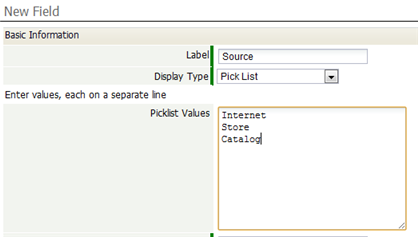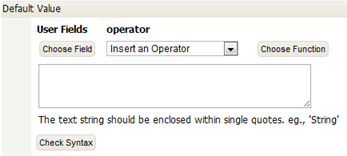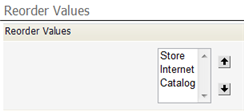Enumerated Fields
Enumerated fields provide powerful visual impact in Views, by displaying a graphic image or color-coded label in place of field values. Enumerated fields have an associated numeric value, which can be used to group, sort or filter data in Views and Reports. In Reports, enumerated fields can appear as color-coded labels, only.
These Field Display Types are enumerated:
About Enumerated Fields
Enumerated Fields in Views provide users with visual indicators of a data metrics. In this example, a movie library View is enhanced with the addition of stars to rank the movies by preference. Although the ranking (Picklist Value) is not displayed, it is used to sort the list.
- File:Movie-name.gifSorted by Movie NameFile:Movie-rating.gifSorted by Movie Rating (Stars)
- The ranking (with 1-4 stars) is created by adding a series of images and values to eligible Field Display Types:
Because the Picklist Value is stored in the database, it can be used in these areas of the platform: - Sort order in Views and Reports
- Filters in Views and Reports
- Color coding criteria in Views and Reports
- Grouping criteria in Reports
Learn more: Using Enumerated Picklists with Other Platform Elements
- Enumerated fields include these elements:
- Display Label
- Can be either an alphanumeric string or an image, or both
- Alphanumeric string, with optional color coding for text and background color
- Image, optional, selected from the Documents object
- Not used to group, sort, or filter records
- Item Value
- Stored as part of the record
- Used to group, sort, or filter records
- A number that can be used to define the display order
Working with Picklists
A Picklist is a field that can contain a list of values. It appears as a dropdown list when displayed.
Create a Picklist
- Click
 > Customization > Objects > {object} > Fields
> Customization > Objects > {object} > Fields - Click [New Field]
- Provide the information in the sections below.
- Click [Save]
The field is added, and the field-definition is shown.
Basic Information
- Specify the basic characteristics of the field:
- Label - The text that appears as the field name
- Display Type - Picklist
- Picklist Values - For a simple Picklist that returns the same values it displays, with no special colors, images, or groups for the display values, you can simply enter the values, as shown here:
- Otherwise, wait until the Picklist has been created, then Manage and Reorder Values.
- Maximum Storage Length - The String length of the longest value in the list.
- Use First Value as Default - Otherwise, the field is initially empty.
- Sort List Alphabetically - Otherwise, you manually arrange the order.
- Skip Value Validation - When checked there is no validation of the Enumerated Values. By default, this option is unchecked.
- Always Required - A selection must be made when adding or updating a record.
- Field Name - Automatically created by the system (but you can change it here)
Display Attributes
- Determine where the field is displayed in the default form, and whether or not the field is required when adding or updating a record.
Default Value
In general, the default value you specify will be a simple String. For example: 'rush'. But it is also possible to select functions and specify arguments, creating a formula expression that returns the default value.
- Considerations
-
- The default value must resolve to the value of an entry in the list of enumerated items (not a label).
- If the value resolves to a string which is not in the list of the enumerated items, it is as though no default were specified. Nothing is pre-selected in the Enumerated Field.
- Field Visibility determines which roles can see or edit the field.
Description Information
- Include a description of the field and its use. This information is only visible to users with rights to customize this field.
Working with Global Picklists
Create a Global Picklist
- Click Designer > Global Resources > Global Picklists
- Click the [New Global Picklist] button and enter the following information:
- Name - The field label that will be displayed
- Show First Value as Default - Checkbox
- Sort List Alphabetically - Checkbox
- Click [Save].
You can now proceed to Manage and Reorder the Enumerated Values, as explained below.
Specify a Default Value
To specify a default value for an enumerated field:
- Click [Edit]
- Type in a value or select functions to create a formula expression that returns the default value.
- Considerations
-
- For checkboxes, the formula must resolve to 1, 0, true, or false.
- The default value must resolve to the value of an entry in the list of enumerated items (not a label).
- If the value resolves to a string which is not in the list of the enumerated items, it is as though no default were specified. Nothing is pre-selected in the Enumerated Field.
- Default values cannot be specified for a Dependent Picklist. (For all other types of Enumerated Fields, they can.)
Setting Colors and Images for Enumeration Values
For a simple list with no colors, images, or group labels, you can simply specify the values when creating the field, as in this example:
Once the field is created, however, (whether or not you have specified any values), you have many additional options, as explained in Manage and Reorder Enumerated Values, below.
Manage and Reorder Enumerated Values
The Enumerated Values section of the field-definition page, lets you specify the picklist values and the order in which they appear.
To specify which values appear:
- Click [Manage Values]
- Click the box under the Trash can to remove an item.
- Click [Add More Rows] to add additional items
- Click [Save] when done
- Settings
-
- Display Label - The label to display in the list.
- Value - The actual value that is stored in a record (or returned to a program) when the item is chosen from the list. When the field is used to group, sort, or filter records, it is the value of the field that determines the outcome.
Note: Alphanumeric Characters are allowed in labels and values, including special characters (+ / ' - _) and spaces.
Reorder Values
In the Enumerated Values section of the field-definition page, click [Reorder Values] to change the order in which the values appear:
Additional Operations
Create a Dependent Picklist
When the possible choices depend on selections made in other fields, use a Dependent Picklist.
Using Enumerated Fields with Other Platform Elements
Because Picklist Values can contain alphanumeric characters, additional functionality becomes available, as listed here:
- Sort order
- Use the Picklist Value in Views and Reports to define sort order
- Grouping
- Use the Picklist Value to Group records in Views and Reports
- Display in Views
- The Display Labels are shown when displaying a record and in Views. Based on the options selected, the image and the text colors will be shown.
- Color coding in Views
- Criteria can be specified using Display Labels or Picklist Values; The first match is done using the Display Label, followed by the Picklist Value
- Searches/Filters in Views
- Criteria can be specified using Display Labels or Picklist Values; The first match is done using the Display Label, followed by the Picklist Value
- Global Search
- Global search will use only the Picklist Values
- Display in Reports
- The Display Labels are shown (no images or color coding are displayed)
- Reports must not use the Group option
- REST or JAVA API
- The Picklist Values are returned (not the Display Label)
- Dependent Picklists
- Learn more: Dependent Picklist
- Conditional Layouts
- Layout rules will use only the Picklist Values


